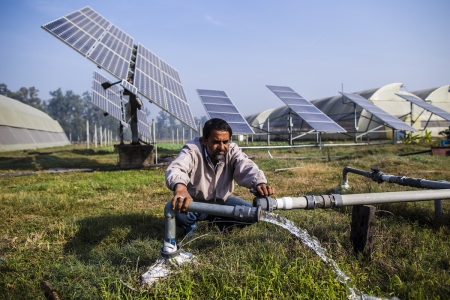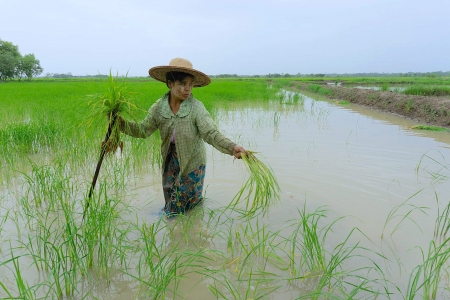Imagine you’re presenting your research at a conference to a room full of experts. If you’re lucky, the room holds 100 people, maybe even 500. But what if you could reach 1,000 people, or even 10,000 people? What if the conversations at conferences could continue outside and beyond the event – incorporating wider audiences and lasting past the set end date?
I joined the CGIAR Research Program on Water, Land and Ecosystems (WLE) in 2012, a few months after it officially launched. The program was initiated based on the recognition that to feed 9 billion people by 2050, a significant paradigm shift would need to occur, one that would allow agricultural production to increase while protecting and enhancing the vital ecosystem functions on which we depend.
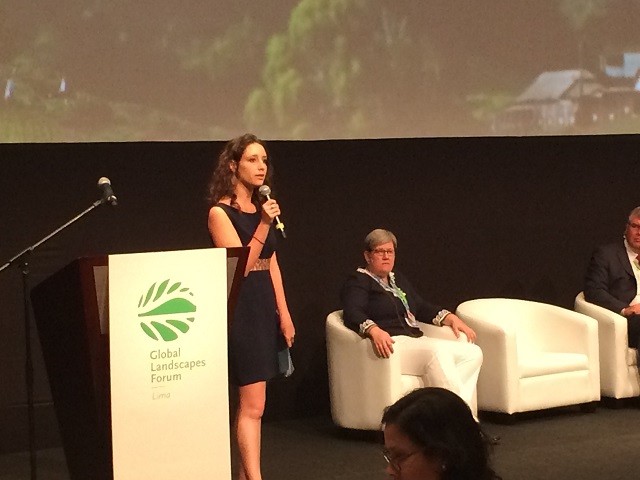
We recognized early on that in order to achieve these goals of sustainable intensification, we would need to work across sectors and engage with professionals and discourses outside of CGIAR.
WLE wanted to develop a space where researchers, development professionals and academics could engage in constructive dialogue and debate. Instead of publishing solely promotional content for the research program, our goal was to stir opinion, liven discussions, and invite people outside of the CGIAR consortium to engage in discussion and debate. In doing so, we sought to open up our research to wider audiences and engage them in a critical debate on how agriculture and natural resource management can reduce poverty.
And thus, the Agriculture and Ecosystems blog (now Thrive) was born.
Creating value
At first, it wasn’t easy to sell this idea to our management team and many of our researchers. The value of an informal discussion space was difficult to convey. Wasn’t it enough to publish papers and create policy briefs?
As Aditi Mukherji, a former researcher with IWMI, put it quite compellingly, blog posts allow her to reach thousands of people, many of whom she wouldn’t have interacted with at conferences. In 2012, her personal blog had over 3,000 visitors from over 60 countries. At the time, she was the only researcher at IWMI with a personal blog.
“The AgEco systems blog [Thrive] has brought in a lot of new voices that you would not have had in IWMI if you were just talking to yourself.
I hope that blogging will help me organize my thoughts better and in the process instill a discipline of writing and writing regularly on issues that excite and inspire me. After all, in our field of research, we either publish or perish!”
With the help of researchers like Mukherji, we began demonstrating the benefits of blogging. One campaign early in the blog’s inception was a review of a research publication. The online journal agreed to grant open-access privileges to the publication for a month after the blog was published. We saw publication downloads increase exponentially, from about 5-20 downloads per month to over 680 downloads in the month that the blog was published.
We started speaking with the researchers using their language; increasing publication downloads was a strong hook that bridged our objectives of increased discourse and promoting the programs outputs to the researchers’ objectives of increasing paper downloads and citations.
Shortly after this campaign, Stephen Carr, formerly of the World Bank and an expert on African agriculture, posed a question on the blog that received thousands of views and hundreds of responses: In African agriculture, does farm size really matter? The debate was so dynamic that it generated two response pieces, one from WLE management and one that aggregated comments from the public.
By the beginning of 2013, the blog had started proving itself to many as a valuable space to connect more people to our research and to foster discussion and debate.
In the coming months and years, communicators and researchers worked together to uncover interesting stories in our work and that of our partners. Questions were posed, interviews conducted; we even ran blogging workshops for researchers in a number of our regional offices.
Building the ecosystem services debate
More importantly, however, was the depth of the conversation and engagement that the blog has garnered. In a field where there are often more questions than answers, we invited experts from a variety of sectors to debate questions that we have considered central to agricultural development. For example: Can Africa afford to save its soils? wherein contributors discussed if farmers could afford to invest in organic agriculture or if the payback period was too lengthy. Others have debated: What would it take to strengthen women’s land rights? with experts commenting on the role of the law, civil society, education, and communal land ownership. See our full list of debates here.
The blog has also contributed to raising the profile of discussions around sustainable intensification and ecosystem services. It has become one of the “go to” places for academics and professionals in this space and serves as an important repository of stories and lessons from the program, partners, and others related to these topics. If you look closely enough, you’ll even see progression and evolution in the way in which we discuss issues of sustainable intensification, agriculture and ecosystem services from our directors, see Simon Cook’s first blog to Andrew Noble's blog on WLE's green revolution.
When we asked researchers, communicators and other blog readers to tell us about their impressions of the blog, they commonly report that Thrive is the only space that dares to bring up controversial issues and that focuses on stimulating topics.
In the CGIAR environment, Thrive is the only blog that dares to bring up controversial issues...The biggest difference though is on topics and how they are written about.
- Peter Casier, Online Media Consultant
Facing challenges
There are some challenges and questions we continue to face.
There are researchers and senior staff who have become very supportive of the blog and continue to use it as part of their research. On the other hand there are some who remain skeptical about its efficacy and impact. We continue to bring evidence to demonstrate the impacts.
We are also continuously working with scientists to define what we mean by a ‘blog’ piece. As such, WLE has attempted to separate out critical debate and promotion. The blog is meant to be a critical space for reflection, analysis and potentially disagreement (based on scientific evidence). The WLE website continues to be a space to showcase WLE work, providing information on how the program achieves progress through solution-based stories. We see these as interlinked but separate spaces. Getting the right voice and story line is a challenge that we continue to learn about.
Related to this is the challenge of remaining a safe space for discussion on controversial topics or among experts with divergent opinions. We work across a number of regions and countries where issues of sustainable intensification and agriculture tread on politically sensitive lines (e.g. in the Mekong and East Africa). That first blog campaign that resulted in hundreds of article downloads was in fact one of our most politically contentious posts as it was a critical review of the Mekong River Commission.
We realized that in order to maintain a safe space to discuss politically sensitive issues, where management, researchers and partners feel comfortable engaging in dialogue, we would need to think of approaches that allow for critical discussion but also that address their concerns. This includes a number of protocols such as seeking feedback and advice from senior management, informing partners of critical pieces and putting a disclaimer on each post, unfortunately resulting in a bit of ‘self censorship’. We recognize that we are not a ‘news agency’ reporting evidence but rather a place for discussion, which also has political considerations and implications.
These have been important lessons for us to learn because in order for the blog to succeed, it has been imperative that our authors and our readers understand the way in which we ensure scientific integrity.
Looking forward
After 3.5 years as manager of Thrive, I have decided to move on to new opportunities. As I prepare to hand over management to the Thrive team, I have been reflecting on some of my hopes for the blog.
First, I hope that the blog can continue to reach wider audiences and voices. The biggest demographic that we are missing from our authorship are the farmers. As the internet continues to become more accessible and reliable globally, and with the creative media resources available, it will become easier to capture their voices.
Second, as CGIAR continues to reform, I hope that other CGIAR centers and programs will engage with Thrive. This platform can be a safe space to foster opinion-sharing across CGIAR centers and programs. Just as the Guardian’s Poverty Matters blog is a respected space for development professionals to share opinion, so to can Thrive be a similar space specializing in agricultural development and land use dialogues. I look forward to seeing how this develops in the future.
Finally, I’d like to offer a special thanks to Michael Victor for imparting his vision, communication insight and trust in me over the years. Also to James Clarke from IWMI who shared invaluable wisdom from the reporting world. To the entire WLE communication and operations teams, including our closest current faction of Mia Signs, Marianne Gadeberg and Janine Furtado. And finally a big thanks to Fabrice DeClerck, Andrew Noble, Simon Cook, Martina Mascarenhas, Ilse Pukinskis and Aditi Mukherji who were critical influencers among the research community.
If you’re interested in getting more involved with Thrive, email Michael Victor: m.victor(at)cgiar.org.



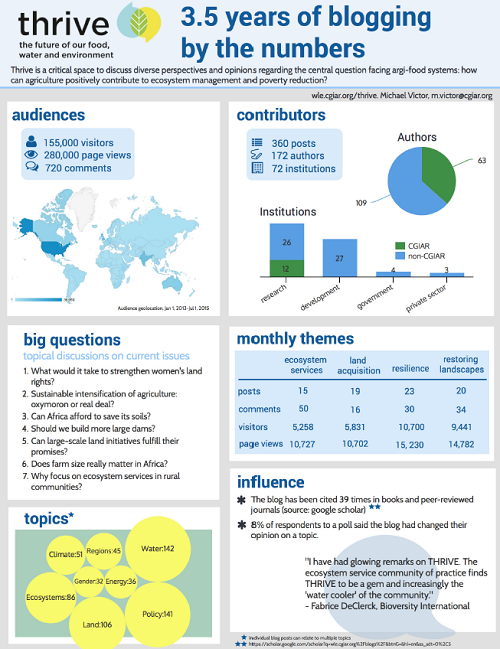
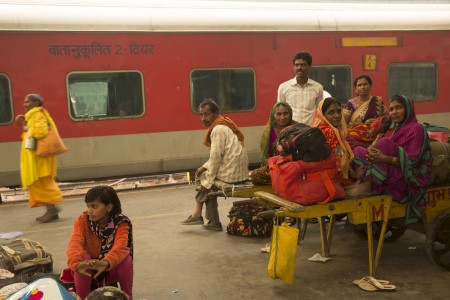
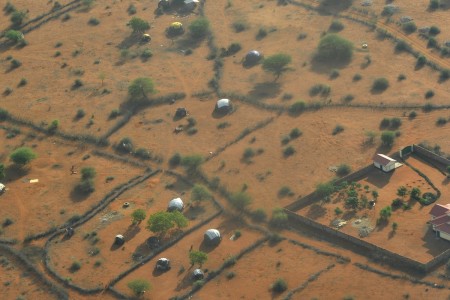


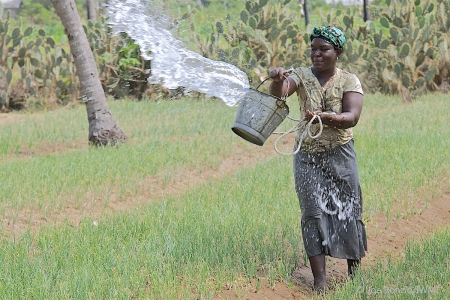


/index.jpg?itok=EzuBHOXY&c=feafd7f5ab7d60c363652d23929d0aee)


